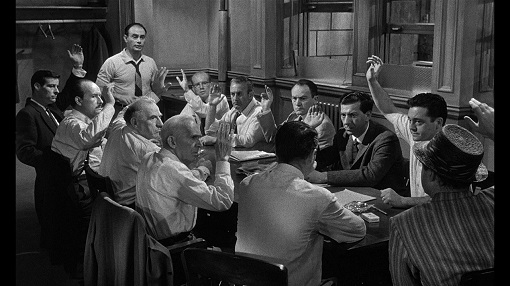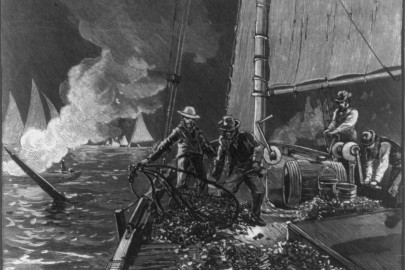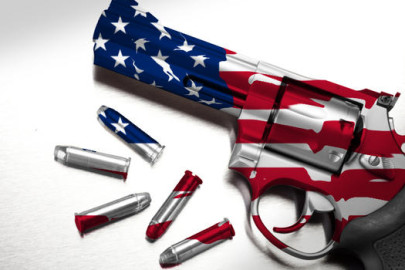In today’s dispatch, Rita recalls her very own courtroom drama…
“Moon pie! Moon pie!” A young man’s voice shouted this nonsensical phrase over and over in the background of the 911 recording as the voice of an elderly woman calmly explained her emergency. Her back door had burst open and a young man fell bleeding onto her kitchen floor. “What’s that he’s saying? What’s he saying?” asked the dispatcher. “Moon pie. Don’t make no sense to me” said the old lady. “But he’s bleeding mighty bad. You hurry now!” she urged the dispatcher. This wasn’t a scene from a movie or a TV crime show. It was the first piece of evidence presented to the jury in the trial of a young man whose nickname was Moon Pie. He was charged with several counts, including robbery, grievous bodily wounding, and use of a firearm in the commission of a felony. He was just 17 years old and charged as an adult. We were in Courtroom Number 5 of the Circuit Court of Montgomery County, Maryland and I was Juror Number One, the foreperson of the jury.
I hadn’t expected to be involved in anything so dramatic when I was called to jury duty not too long after I became a United States citizen. For most people it was a day off work sitting around reading or bored and never actually being called upon. But when I reported for duty in a room filled with hundreds of people I found I had drawn the number One. Of course I was called and in Courtroom Number 5 the judge explained that this was a criminal trial that would last several days. Jury selection began with some routine questions. A few people were excused for hardship reasons. Then some were called up to the bench where attorneys for each side asked more detailed questions. I was called up and asked what I did for a living. When I replied that I was a librarian the defense attorney smiled broadly and nodded to the judge to say I was accepted. Later a lawyer friend told me that defense attorneys love librarians as we have a reputation for being bleeding heart liberals. As things turned out that didn’t help his client.
There followed four intense days of hearing testimony, taking notes, and struggling to keep silent about the case when I got home, for the judge instructed us not to discuss it even with family members. It was a strange, isolating experience. During breaks in the proceedings the jurors couldn’t discuss the case so we had the stilted conversations of strangers with nothing in common thrown together by happenstance. There is a law of nature that every random group includes an obnoxious loudmouth and one juror stepped into this role with relish. Over lunch in the courthouse cafeteria one day Loudmouth sat at a table with me and a young African man who was an engineer. Loudmouth started going on in patronizing tones about how he so admired people who immigrated to America for the right reasons. “I’ve no objection to immigrants who come to this country so long as they work hard,” he intoned sanctimoniously. He was obviously talking to the African man who exchanged amused, eye rolling glances with me. Like the African, my accent marked me as an immigrant but I was somehow not included in Loudmouth’s definition of the “other.” Racial issues were on our minds, for the trial was that of another young black man, a teenager whose promising life hung in the balance, whose fate would shortly be in our hands.
The facts of the case were these. The victim, also a black teenager, who had so memorably identified his assailant on the 911 tape, survived the life-threatening gunshot that passed through his lung. He testified to the evening he walked through the park behind the old lady’s home and was confronted by two men who robbed him and shot him as he fled. The man with the gun was a stranger in his mid twenties; he recognized the teenager as his friend Moon Pie. The victim was quite clear that it was the older man who carried the gun and shot at him. A taxi driver, another hard-working immigrant for Loudmouth to admire, testified to picking up two men near the park that evening around the time of the shooting. He identified the defendant as the younger of the two. He drove them to a home where the younger man got out after an intense conversation with his older companion. The address was where Moon Pie lived with his adoptive parents.
As the days went by the courtroom styles of the prosecution and the defense made for a striking contrast. The prosecutor was a short, nerdy guy with a mild manner who often shuffled his papers as though he were disorganized. The defense attorney seemed to think he was starring in a movie; he strode about the courtroom with flamboyant gestures, his questions of the prosecution witnesses posed with an expression of incredulity at their testimony. But the prosecutor’s evidence steadily piled up while the defense attorney’s manner appeared more and more like empty bombast designed to distract.
The most affecting moment of the trial came when Moon Pie’s adoptive father testified as a character witness for the defense. There was an almost audible intake of breath from the courtroom as he walked up to the witness stand. He was an elderly white man wearing a hearing aid and leaning on a cane. It transpired that he was a retired high school football coach who had seen promise in the young man. It was not clear how and why Moon Pie lacked a family of his own, but two years before he had been taken in by the Italian American coach and his wife. The man spoke now with a tone of deep sadness and confusion at what had come to pass. On cross-examination he confirmed that Moon Pie had arrived home by taxi on the night and time in question.
In the afternoon of the fourth day the judge handed the case to us, the jury. We were a mixed group, slightly more women than men, three black women, the one African man, and one Hispanic. As the foreperson I felt a terrible weight of responsibility fall on me. From the moment the victim testified that it was the older man who carried the gun and shot him, I had felt a sense of relief that I could vote “not guilty” with a clear conscience. But the judge’s instructions on the law said otherwise. The law dictated, she explained, that if we believed the defendant had been at the scene and participated in the robbery, then he was as guilty as the person who fired the gun. I was also nervous about how I would handle it if racial discord arose in the deliberations. There were plenty of rumors in news stories about jurors refusing to convict another young black man whatever the facts. And Loudmouth was potentially an unpredictable loose cannon.
But I had a plan. Ever since watching the iconic film Twelve Angry Men I had resolved that if I were ever on a jury I would want to ensure that each person got to make their first statement completely uninfluenced by any of the others. I proposed that we each write our initial thoughts on the case on a piece of paper marked with our juror number. I would collect the papers and read each aloud, with the juror then given however much time they wanted to expand on what they had written without interruption. I explained that the purpose was to allow each person to have his or her initial say uninterrupted and uninfluenced by anyone else. Everyone agreed, and I believe that this initial fairness enabled the jury to work together with trust and respect. After our opening statements there was a lot of discussion and examination of particular evidence and testimony, but it soon became clear that there was no escaping the facts or the judge’s instructions. Moon Pie was guilty under the law, even if most of us believed he had just fallen in with the wrong kind of company. There was a heavy sense of sorrow in the room as we took a final vote on all three counts and came in unanimous for guilty. Loudmouth, however, chose this moment to interject the racial issue with a sanctimonious speech. He felt bad, he said, sending a young black man beloved by his football coach to prison. Perhaps we could tell the judge we wanted a lenient sentence because it wasn’t really his fault. I was relieved when one of the black women shut him down contemptuously, obviously seeing his speech for the empty pandering it was. I took a last poll of the jury, asking them if anyone had any final reservations or wanted to change their vote. No one did. Some tears were shed as I filled out the paperwork with our verdict and prepared to go before the court. No one was happy about what we had to do. But we knew our duty, all of us.
In the courtroom I had to stand and say “Guilty” in response to each of the charges as they were read. My hands were shaking and I felt the eyes of the defense attorney on me, the librarian who had let him down. Maybe he had underestimated me. There were anguished cries from the spectators’ benches, which were crowded with Moon Pie’s friends. I saw the Italian American couple tearfully hugging one another. As the jurors filed out of the courtroom, into the elevator, and out to the parking lot, armed Sheriff’s Deputies accompanied us all the way to our cars, for our protection, they said.













Great story, Rita. What did the young man go down for? Did they catch the other guy?
I seriously dread ever being called up for jury duty, mostly as I have a deep seated aversion to doing blindly as the rules tell me. Perhaps I’ll end up on the other side of the courtroom instead, on trial for beating a hipster to death with his own artisinal craft beer bottle
The case was less interesting when I last served on a jury, but the posturing of the defense lawyer was the same. I wonder how differently lawyers today might behave if they hadn’t been raised watching fictional representatives of their professional strut and perform on television and in the movies.
Why on earth would anybody think you’re a bleeding-heart liberal, Rita?